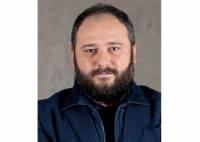goEast presents the centrepiece of the festival: The Competition for Central and Eastern European feature films and documentaries
Festivals 02-04-2021Partisans, provinces and post-socialism - the Competition at goEast // goEast welcomes its Competition jury to Wiesbaden // Save the Date: goEast 2021 press conference
It’s less than a month until the 21st edition of the goEast festival of Central and Eastern European filmorganized by DFF - DeutschesFilminstitut & Filmmuseum (April 20th to 26th) gets underway. The festival organizers will have to show their audience almost all of the 92 festival films online this year, but with jury and press screenings in the cinema they also underline the importance of the festival as an industry event. goEast offers its broad-ranging audience the chance to experience the highlights of current Central and Eastern European film via the Competition, the centrepiece of this year’s festival. An international jury and the FIPRESCI film critic jury will be awarding the prizes. A special honor this year: the “Golden Lily”, endowed with 10,000 euros forms the main prize of the goEast Competition.
The Competition films will made available online in cooperation with the VoD provider filmwerte. Discussions with filmmakers during the festival week will round off the Competition's programme. The recorded film talks will be available on the goEast website after the respective conversations every day from 3 p.m onwards. Press screenings of the Competition films will take place in the DFF cinema in accordance with the current COVID-19 pandemic protection regulations of the state government of Hessen.
Partisan, Provinces and Post-Socialism - The Competition at goEast
The Competition entries derive from the entire post-socialist area of Central and Eastern Europe and the former Soviet Union. They will provide the viewer a window on the current facets in partisan stories, the clash of indigenous cultures with majority societies and the contrast between rural life and big cities - and Eastern European companies. goEast will place equal focus and importance on all of the films, some of which are even German premieres, as they all equally represent the diversity of their respective production countries.
Partisan stories are not only an important basis to Eastern European social context but traditionally in the film culture too where they even have their own partisan film genre. Contemporary partisan stories in film express, amongst other things, resistance to right-wing tendencies. In LANDSCAPES OF RESISTANCE (Serbia, Germany, France 2021), one of the first partisans in Serbia is accompanied on her intellectual journey into the past. Marta Popivoda's description of her resistance in the Auschwitz concentration camp make it clear that fascism is still an acute threat today. Vera Lacková, whose grandfather was also a resistance fighter that went on a personal journey to trace the history of her Roma family is still met with a lot of rejection even today. As a Roma director in the Czech Republic, she filmed her experiences in HOW I BECAME A PARTISAN (Czech Republic, Slovakia 2020). The film will celebrate its world premiere at goEast on 22 April, which the director will accompany with a podcast. With the historical partisan drama IN THE DUSK (Lithuania, France, Czech Republic, Serbia, Portugal, Latvia 2020), ŠarūnasBartas will present his latest work on goEast for the first time in Germany. In the dark story of the fight against Soviet troops in Lithuania in 1948, the director critically deals with the myth of the “forest brothers”, which has led to fierce controversy in his home country.
An additional series of Competition entries shows the tension between indigenous cultures and majority societies. This includes the documentary LIFE OF IVANNA (Russia, Norway, Finland 2021), that shows how life in the city is indeed similar to the nomadic life of indigenous peoples that has been threatened through exclusion in post-Soviet Siberia. Power struggles among men and the resulting conflicts for the protagonists in Lapland can be seen in the Nordic Western THE LAST ONES (Estonia, Finland, Netherlands 2020), directed by VeikoÕunpuu, one of the most famous directors in all of Estonia. The award-winning director and goEast regular AdilkhanYerzhanov chose a black-humored approach to the topic in his film ULBOLSYN (Kazakhstan, France 2020). In it, the protagonist of the same name, Ulbolsyn, takes action against the arranged marriage of her younger sister and thus takes a courageous stand against provincial traditions that assert themselves against military command.
A special contrast has been made in this year’s Competition between the “hinterland” and the big city film. The urban space of Budapest in 35mm pictures is the setting for a dramatic love story in PREPARATIONS TO BE TOGETHER FOR AN UNKNOWN PERIOD OF TIME (Hungary 2020): After a woman gives up her medical career in the USA and returns to Budapest for her lover, the latter denies to even knowing her. Her despair becomes an ever-increasing obsession of love. In contrast, family encounters in rural areas emerge in BILESUVAR (Azerbaijan, France 2020) and CHUPACABRA (Russia 2020). In the latter, a boy tries to escape his family problems by fleeing into a self-created fantasy world. In many rural regions, the lack of communication infrastructure continues to be a major problem. PLEASE WAIT (Austria 2020) accompanies unexpected everyday heroes: cable technicians. The documentary sheds light on this often-neglected profession and the importance of communication, without which modern life in the more rural regions of Ukraine, Moldova, Romania or Bulgaria seems almost impossible. Vitaly Suslin continues the of the black humor approach to film versus reality with PAPIER-MACHE (Russia 2020). In the film, the unlikely film hero and eternally unlucky man Ivan Lashin plays himself in a provincial drama that deals with past loan transactions. Instead of blurring reality and fiction, the real-political drama SHOULD THE WIND DROP (France, Armenia, Belgium 2020) by Nora Matrirosyan is devoted to an airport that at the centre of a political tug-of-war that ultimately determines the legitimacy of the unrecognized Nagorno-Karabakh / Artsakh state. HOLY FATHER (Romania 2020) and ONCE UPON A YOUTH (Croatia 2020), the director Ivan Ramljak’s homage to his friend the amateur photographer Marko finally provide an intimate perspective into the filmmaker's own life.
An additional visual contrast is opened up by the black and white films THIS RAIN WILL NEVER STOP (Ukraine, Germany, Latvia, Qatar 2020) by Alina Gorlova, that covers impressively covers the Donbas conflict and problems of refugee life in exile, and the debut film by JujaDobrachkous BEBIA, À MON SEUL DÉSIR (Georgia, United Kingdom 2020), which sends its young protagonist on an atmospheric journey into the past.
goEast welcomes its Competition jury in Wiesbaden
goEast is pleased to welcome international industry representatives to the Competition jury again this year. That includes the outstanding artist and director Saodat Ismailova, who has been involved in various contemporary art initiatives in Tashkent since 2020 and is actively involved in numerous film projects. Her feature film CHILLA and some of her more experimental works will be shown at this year's symposium. Producer and filmmaker VoliaChajkouskaya (including THE ROAD MOVIE) from Belarus is not only the founder of her own production company, but also the second largest film festival in her home country, “Northern Lights” in Belarus. The documentary filmmaker Thomas Heise is a member of the European Film Academy and lectures at several universities in the field of film and television. He has received several awards for his documentaries, including the German Documentary Award for HEIMAT IS A ROOM FROM TIME (Germany 2019). Also participating is the award-winning actress, director and Roma activist Alina Dieerban, who represented her home country Romania in Cannes in 2018 and won the German Acting Award in 2020 for her film GYPSY QUEEN (Germany, Austria 2019). Film critic Jay Weissberg has been writing for the American magazine Variety since 2003 and has extensive experience as a jury member at film festivals. Since 2015 he has been the artistic director of the Silent Film Festival in Pordenone. The Competition jury will, as far as possible, view and evaluate all Competition films in the Caligari FilmBühne.
Save the Date: goEast 2021 press conference
Don't miss out: the annual press conference in the run-up to the festival will take place this year in the form of a video conference on April 16th at 11 a.m. Early registration is requested. The dial-in data will be sent in advance in a separate notification.
Please also take the opportunity to get festival accreditation April 12th. You can find the registration under: Accreditation
During the festival period, an online media library with almost all of the films originally planned will be available to accredited trade visitors and representatives of the press.
You can find images related to the festival and festival programming in our download section.
Here you can access the complete programme for the 21st edition of goEast - Festival of Central and Eastern European Film.
goEast – Festival of Central and Eastern European Film is hosted by DFF – Deutsches Filminstitut & Filmmuseum and made possible with the support of numerous partners. Primary funding partners are HessenFilm und Medien GmbH, the State Capital Wiesbaden, Kulturfonds Frankfurt RheinMain, BHF BANK Foundation, Adolf und Luisa Haeuser-Stiftung für Kunst und Kulturpflege, Renovabis and Deutsch-Tschechische Zukunftsfonds. Media partners include 3sat, Deutschlandfunk Kultur and Frankfurter Allgemeine Zeitung.
FNE Podcast: SOFA School of Film Advancement: Nikolaj Nikitin and Oliver Baumgarten speak to Irena Gruca-Rozbicka (SOFA 2019/2020) about the launch of her project CREW UNITED POLSKA
Podcasts 24-03-2021SOFA School of Film Advancement: Nikolaj Nikitin and Oliver Baumgarten speak to Irena Gruca-Rozbicka (SOFA 2019/2020) about the launch of her project CREW UNITED POLSKA
For the first time, Georgian animation film at the Tokyo Museum of Photography at Yebisu International Festival For Art & Alternative Vision, 5 - 21 February 2021.
Screening:
2/9 Tue. 18:00
2/21 Sun. 11:30
The theme of this year's festival is "E-MOTION GRAPHICS"
The film is selected in the section "Animation that sharpens your senses".
The festival was founded in 1995.
Organizers: Tokyo Metropolitan Government, Tokyo Photographic Art Museum, Art Council Tokyo (Tokyo Metropolitan Foundation for History and Culture) and Nikkei Inc.
https://www.yebizo.com/en/program/detail/2021-04-07
This is the second visit of the "Abandoned Village" to Japan.
On November 23, at the Hokkaido International Animated Film Festival NEW CHITOSE, the film won an award from the Ministry of Foreign Affairs of Japan and received such an assessment: “It is an interesting film, you can not understand in what period of time the action takes place. For example, it could be a one-week or a 200-year period. This is the director's debut work. She is an actress of "Budurgana Gagra" (www.budurgana.ge) Georgian State Hand Shadow Theater. "
"Abandoned Village" is the debut-animation film directed by Mariam Kapanadze, which was created at film studio "Kvali XXI" (https://www.facebook.com/Film-Studio-KVALI-XXI-192774534600815) and the film center "Georgian Film-Abkhazeti" (https://www.facebook.com/GeorgianfilmcenterABKHAZETI).The film was funded by Georgian National Film Center (http://beta.gnfc.ge/?fbclid=IwAR04HqbeuIb6vIBR9VvM5jUe6Vtr_BqOYKPeANWUjBJ_HxrdtwFqU1U7Rkg).
After the successful world premiere in Japan, the Georgian animation film was invited to the famous international animation festival "ANIMATEKA" in Ljubljana, Slovenia and now the film is again hosted by Japan.
Contact Person:
Mariam Kandelaki, Producer
This email address is being protected from spambots. You need JavaScript enabled to view it.
Last week, the last regional festivals of the 22nd One World International Human Rights Documentary Film Festival were to take place. Today it was to be celebrated and balanced. Unfortunately, the coronavirus period, in which the year 2020 changed, did not even allow the festival to take place according to plan. Due to the protection of health but also the desire not to deprive the audience of film experiences, the festival spread from March to October after the first interruption, and yet it had to be forced to end for the second time. Given the overwhelming amount of energy that regional teams in particular spent on this non-standard situation, the festival's organizing team decided to hold the 23rd year in a new deadline and changed format. The One World 2021 Festival will take place from May 10 to 28.Last week, the last regional festivals of the 22nd One World International Human Rights Documentary Film Festival were to take place. Today it was to be celebrated and balanced. Unfortunately, the coronavirus period, in which the year 2020 changed, did not even allow the festival to take place according to plan. Due to the protection of health but also the desire not to deprive the audience of film experiences, the festival spread from March to October after the first interruption, and yet it had to be forced to end for the second time. Given the overwhelming amount of energy that regional teams in particular spent on this non-standard situation, the festival's organizing team decided to hold the 23rd year in a new deadline and changed format. The One World 2021 Festival will take place from May 10 to 28.
"After the interruption in March, we decided to continue after the holidays mainly due to regional festivals, which could not take place at all. We were extremely happy that the vast majority of regional teams decided not to deprive viewers in their cities of strong documentaries and to devote twice as much time and effort to this year. We are all the more sorry that some cities could not hold the festival for the second time on the deadline. In any case, I take off my hat in front of all the regional teams and thank them very much for their work and commitment, which showed fate in spite of them, ”says festival director Ondřej Kamenický.
Some cities, whose replacement dates were scheduled for the second half of October, in view of the unfavorable development of the situation and the deteriorating conditions for organizing cultural events, decided not to continue preparations in September or early October. Other festivals have started, but under very limited conditions. The measures taken by the second state of emergency then put a definitive stop to the festivals in Znojmo, Tábor and Liberec.
"Under normal circumstances, we would be fully preparing for the next year these days. Unfortunately, the normal circumstances of culture, like the rest of society, probably do not wait a while. It is necessary not to succumb to skepticism and try to adapt to the new situation. But for that it is necessary to stop for a moment, take a breath, gain new strength and reflect on the possibilities. That's why we decided to postpone the deadline. We all want to think together about how the festival must adapt and what good we can find for the audience, for all those who participate in the organization of the festival and for the future of the festival as such, "summarizes the executive director of the festival Lenka Lovicarová reasons for moving the date of the festival is May 2021.
We will keep you informed about the specific changes that the traditional form of the festival will go through.





























